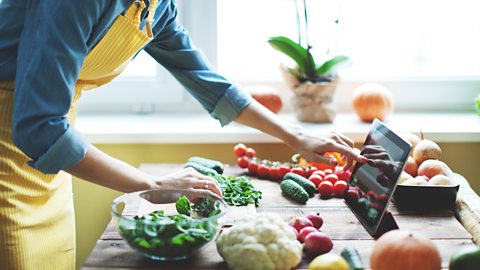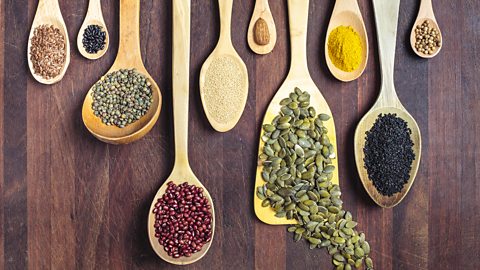How to go vegan
Veganism, as defined by The Vegan Society, is 'a way of living that seeks to exclude, as far as possible and practicable, all forms of exploitation of, and cruelty to, animals, for food, clothing or any other purpose'. A vegan diet is free from all animal products, whether derived by slaughter (such as meat), or otherwise (such as eggs, dairy and honey).

Challenges of a vegan diet
The rapid rise of veganism in the UK has resulted in an explosion of new foods and ready meals, so itÔÇÖs never been easier to start a vegan diet. Removing all animal-derived products from your diet brings some nutritional challenges, but these can be met with awareness and planning.
If you're switching to a full-time vegan diet, itÔÇÖs good to do it gradually. Your body needs time to adjust to the different balance of foods, and the experience will be more enjoyable if you give yourself time to discover the wealth of vegan foods and recipes and research new places to eat out.
DonÔÇÖt assume that all vegan products are healthy. A vegan cake is still a cake, and you can still consume too much processed food, salt, sugar and fat on a vegan diet.
Protein sources
Vegans can struggle to get enough protein in their diets. Men should eat approximately 55g of protein per day, women 45g. Here are some protein-rich foods. Try to include some protein at every meal.
Nuts and seeds are easy to throw into salads or have for a snack, and typically contain 15ÔÇô20g protein per 100g. There's also a growing range of nut butters to try. Peanut powder can be added to smoothies or sauces.
Beans and lentils can thicken sauces, soups, dips and bakes and tend to include about 10ÔÇô20g protein per 100g.
Soya products, of which the best-known is tofu, are fairly low in fat and can be used in a variety of ways. Tofu contains about 8g of protein per 100g. Soya milk and soya yoghurt are also good sources of protein.
Wheat protein (seitan) and fermented soybeans (tempeh) are chewy meat substitutes that are less subtle in flavour than tofu but higher in protein
Protein-fortified products abound, including vegan energy balls. Watch out for the amount of sugar and fat in them though, as protein is not a byword for health, and be aware that it is possible to eat too much protein.

Calcium sources
Because vegans donÔÇÖt consume dairy, calcium has to be found in fortified products. Some plants do contain calcium, but at relatively low levels. Calcium-fortified tofu, soya milk, soya yoghurt, breakfast cereals, orange juice and even breads are available.
Iron sources
A healthy and varied vegan diet should contain enough iron if you eat these foods regularly:
- Beans, lentils and peas
- Tofu
- Seeds and nuts
- Dried fruit, such as raisins, dates or apricots
- Dark-green vegetables, such as kale, broccoli and spinach
- Wholegrain rice and wholemeal bread
- Fruits and vegetables rich in vitamin C, which help make the iron in plant-based foods bioavailable
Omega-3 sources
Omega-3 fatty acids fall into two categories:
- DHA and EPA: these long-chain omega-3 fats have crucial benefits to brain development and heart health and are especially important for young children and pregnant women. The body can make these from ALA, but not as efficiently as if you consume them directly. Microalgae-based omega-3 supplements are available as an alternative to supplements made with fish oils.
- ALA: this type of omega-3 fat is found in a range of vegetarian sources, including chia seeds, ground flaxseed (linseed), rapeseed oil, walnuts, hazelnuts, pecans and green leafy vegetables. ALA canÔÇÖt be made by the body, so itÔÇÖs important to get enough from these sources.
Supplements
There are some vitamins and minerals that are better provided as a supplement to a vegan diet. Check the label to make sure that supplements contain no gelatine or other animal-derived products.
- Omega-3 (see above); it is difficult to get enough omega-3 from a vegan diet, but vegan supplements are available.
- Vitamin B12 is added to several food products, including yeast extracts, non-dairy milks, and nutritional yeast, but if you donÔÇÖt have these foods regularly you should take a supplement
- Iodine levels in food and seaweed are variable so itÔÇÖs difficult to know how much youÔÇÖre getting from food. Taking a supplement will ensure you get enough.
- Vitamin D is made by the body from exposure to sunlight, but the sun isnÔÇÖt strong enough in the UK during winter, so many people take a vitamin D supplement during these months.
Foods to check
Food labelling for allergens should point out where milk or egg derivatives are present, so check this on any processed foods.
Most wines, many spirits and some beers are 'fined' (clarified) or filtered using animal products such as egg white or isinglass, which is derived from the swim bladder of a fish. Read the labels and choose drinks that state that theyÔÇÖre suitable for vegetarians and vegans. The good news is that there's a wider range of good-quality vegan drinks than ever before.
Mycoprotein (Quorn) is sometimes made with small amounts of egg white, though some Quorn products are vegan and are now clearly labelled.
Honey may turn up in vegetarian foods. Vegan substitutes include golden syrup, agave syrup or maple syrup.
Meat stocks can turn up in ready-made soups, risottos and gravies.
Food colouring E120 ÔÇô some sweets or drinks can be coloured with cochineal, the ground up shells of the cochineal beetle.
Whey and casein are milk proteins that can be found in many processed foods such as protein bars, crackers, cookies and crisps. The allergens section of the label should flag this up.
Gelatine is used in sweets, particularly chewy ones and marshmallows. Sometimes gelatine is added to nutritional supplements in capsule form. There are vegan versions available, so shop around.
Pasta can be made with egg, whether fresh or dried.
Foods to try
Nutritional yeast sounds less than appealing, but this deactivated yeast product (also called 'nooch') has the benefit of tasting very cheesy and savoury. It is also rich in B vitamins and protein. Use it in vegan cheese sauces, baking, or as a topping rather like Parmesan.
Aquafaba is a fancy word for the water surrounding tinned chickpeas. Because it contains proteins from the chickpeas, it has the remarkable ability to hold a foamy state when whipped, making it an excellent substitute for egg whites in vegan meringues, mayonnaise and mousses. The efficacy of different brands of chickpeas (and other beans) may vary.
Seitan is wheat protein which is derived from wheat gluten (the protein part of the flour). The gluten is extracted from wheat and then processed to resemble meat. It contains a lot of protein and has a meaty texture. It can be barbecued, glazed, baked, stir-fried, deep-fried or generally cooked in any way meat can be.